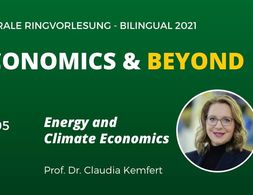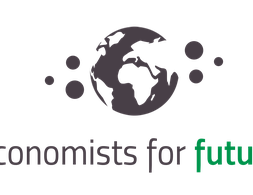93 Ergebnisse
The authors show how consumers, business, the Federal Reserve, and government take into account what's going on around them to make critical decisions like buying new products, building new factories, changing interest rates, or setting budget goals. The book provides a clear roadmap to understanding the whole story behind the global economy.
This course provides a simple introduction to problems that social scientists are working on (e.g. racial disparities, inequality and climate change) in a manner that does not require any prior background in Economics or Statistics.
The Great Recession 2.0 is unfolding before our very eyes. It is still in its early phase. But dynamics have been set in motion that are not easily stopped, or even slowed. If the virus effect were resolved by early summer—as some politicians wishfully believe—the economic dynamics set in motion would still continue. The US and global economies have been seriously ‘wounded’ and will not recover easily or soon. Those who believe it will be a ‘V-shape’ recovery are deluding themselves. Economists among them should know better but are among the most confused. They only need to look at historical parallels to convince themselves otherwise.
Esther Duflo discusses the fact that in social policy one cannot check the big questions, i.e. whether development assistance as an aggregate is helpful, because there is no counterfactual. She then suggests to focus on smaller questions such as what prevents or incentiveses people from immunizing their kids or whether mosquito bednets should be distributed for free. These questions can be answered by using randomized control trials as in the medical sciences. Thus, she argues, by bringing the experimental method to social policy analysis better decisions as to where allocate funds can be made.
Welche Finanzregulierungen gab und gibt es in der Europäischen Union seit der Finanzkrise? Der Vortrag gibt einen Überblick über verschiedene Regulierungen, diskutiert das Problem „too big to fail“, den Einheitlichen Bankenaufsichtsmechanismus und Interessenskonflikte zwischen der Europäischen Zentralbank und der Europäischen Bankenaufsichtsbehörde.
This multimedia dossier is part of the series „Understanding Finance“ by Finance Watch. The dossier focuses on universal banks – banks that pursue commercial and investment banking and points out several problems of those megabanks, especially in the context of the financial crisis (too big to fail).
Firms are the primary places where economic activity takes place in modern capitalist economies: they are where most stuff is produced; where many of us spend 40 hours a week; and where big decisions are made about how to allocate resources. Establishing how they work is hugely important because it helps us to understand patterns of production and consumption, including how firms will react to changes in economic conditions and policy. And a well-established literature – led by post-Keynesians and institutionalists – holds that the best way to determine how firms work is to…wait for it...ask firms how they work. This a clearly sensible proposition that is contested in economics for some reason, but we’ll ignore the controversy here and just explore the theory that springs from this approach.
Is our system capable of energy transition and climate protection? How plural is economic policy in practice and who makes the big decisions? What kind of change do we want?
The third edition of Political Economy: The Contest of Economic Ideas is a fully updated overview of the political economy and its connection with social concerns. This book investigates the main traditions of economic ideas and provides a 'big picture' overview of the analytical tools and value judgements associated with competing schools of economic thought.
Examine what would happen if we were to deploy blockchain technology at the sovereign level and use it to create a decentralized cashless economy. This book explains how finance and economics work today, and how the convergence of various technologies related to the financial sector can help us find solutions to problems, such as excessive debt creation, banks getting too big to fail, and shadow banking.
Written by the Nobel Prize winners in Economics Robert Shiller and George Akerlof, this book shows how deception and manipulation play a big role in the economic behavior of individuals, as well as showing how the assumption of "perfect information" is far away from the truth. Through both quantitative data and stories of how to reduce this noxious phenomenon, the authors paint a pretty different picture of how markets really works in a hyper-communicative scenario like nowadays.
Der Markt soll es angeblich immer richten, dabei plant das Kapital selbst, was das Zeug hält. Mithilfe von Big Data, Algorithmen und Feedback-Technologien wollen die Plattform-Giganten Amazon, Google und Alibaba nichts mehr dem Zufall überlassen: Sie perfektionieren Logistik und Produktion und identifizieren Kundenwünsche, noch bevor sie ausgesprochen werden. Ließen sich die neuen Technologien nicht nutzen für eine Zukunft jenseits des digitalen Kapitalismus? Und wenn ja, wie? Höchste Zeit für eine neue Diskussion über Plan und Markt.
Big challenges lie ahead for our society: increased automation of work, and the threat of catastrophic climate change. But so, too, are the huge possibilities presented by new technology and better ways of organising our economy in the wake of neoliberalism's failure.
Although money plays a key role in our lives, the workings of our monetary system are a mystery to most of us. ‘The Waterworks of Money’ by cartographer Carlijn Kingma is an attempt to demystify the world of big finance. It visualizes the flow of money through our society, its hidden power made manifest.
If you see money as water, our monetary system is the irrigation system that waters the economy. The better the flow, the more prosperous society will be. Just as water makes crops thrive, so money sets the economy in motion. Or at least that’s the idea. In reality, inequality is growing in many countries and people are dealing with a ‘cost of living crisis’. Meanwhile, the progress with making our economies sustainable is stalling, and financial instability remains an ongoing threat. These problems cannot be seen in isolation from the architecture of our money system. If we truly want to tackle them, we will have to address the design flaws of our current money system.
For more info check: https://www.waterworksofmoney.com or https://www.carlijnkingma.com
For the Dutch version of the animation check: https://www.ftm.nl/waterwerk
Current exhibitions: 'The Future of Money' at Kunstmuseum Den Haag, 14 April, 2023 - 8 September 2023. 'Plumbing The System' at the Dutch Pavilion of the Venice Biennale, 20 May 2023 - 26 November 2023
The second animation video of this series will be released in September 2023.
The Waterworks of Money is a collaboration of cartographer Carlijn Kingma, investigative financial journalist Thomas Bollen, and professor New Finance Martijn van der Linden. Kingma spent 2300 drawing hours, based on in-depth research and interviews with more than 100 experts –ranging from central bank governors and board members of pension funds and banks to politicians and monetary activists.
The structure of our monetary system is not a natural phenomenon. We can choose to change its architecture. Designing the money system– and the laws and institutions that govern it–is ultimately a democratic task, and not a commercial or technocratic one. In practice, however, there is a major obstacle impeding the democratic process: financial illiteracy. By making finance and money needlessly complex, economists, bankers and tax specialists have turned most of us into ‘financial illiterates’. Everyone who doesn’t speak their financial jargon is excluded from the democratic debate on how our monetary system should work.
The Waterworks of Money bypasses the financial jargon. It is an attempt to boost systemic financial literacy. Only if ordinary citizens develop their own vocabulary to participate in the debate about their financial future, can they tell their politicians which kind of ‘financial irrigation system’ they want.
Authors: Carlijn Kingma, Thomas Bollen, Martijn Jeroen van der Linden
Animation: Tiepes, Christian Schinkel, Cathleen van den Akker
Narrator: Loveday Smith
Translation: Erica Moore
Voice recording: Huub Krom
Music and sound: Rob Peters
Photography: Studio OPPA
Partners: Follow the Money, De Haagse Hogeschool, Stimuleringsfonds Creatieve Industrie, Brave New Works, Rabobank, Kunstmuseum Den Haag, Rijksmuseum Twenthe
Institutional economics focuses on the role of social institutions in terms of laws or contracts, but also those of social norms and patterns of human behaviour that are connected to the social organisation of production, distribution and consumption in the economy.
It is perhaps fitting that the seriousness of the coronavirus threat hit most of the Western world around the Ides of March, the traditional day of reckoning of outstanding debts in Ancient Rome. After all, problems and imbalances have accumulated in the Western capitalist system over four decades, ostensibly since it took the neoliberal road out of the 1970s crisis and kept going along it, heedless of the crises and problems it led to.
Der Aufstieg des Asset Manager Kapitalismus ändert die Besitzstruktur fossiler Energiekonzerne fundamental. Doch trotz ihrer Exposition gegenüber systemischen Klimarisiken bleiben Asset Manager Akteur*innen des Status Quo, argumentieren Vera Huwe und Stephan Stuckmann zum Auftakt der neuen Economists for Future-Serie.
A historical glimpse of how economists of the 19th century debated the usefulness of mathematics to economics
From the two premises that (1) economies are complex systems and (2) the accumulation of knowledge about reality is desirable, I derive the conclusion that pluralism with regard to economic research programs is a more viable position to hold than monism. To substantiate this claim an epistemological framework of how scholars study their objects of inquiry and relate their models to reality is discussed. Furthermore, it is argued that given the current institutions of our scientific system, economics self-organizes towards a state of scientific unity. Since such a state is epistemologically inferior to a state of plurality, critical intervention is desirable.
The global financial crisis (GFC) led to increasing distrust in economic research and the economics profession, in the process of which the current state of economics and economic education in particular were heavily criticized. Against this background we conducted a study with undergraduate students of economics in order to capture their view of economic education.
The outbreak of COVID-19 has substantially accelerated the digitalization of the economy. Yet, this unprecedented growth of digital technology brought novel challenges to the labour market. Rise in income inequalities and precarious working conditions or polarization of jobs. In this essay, we try to assess what tools to use to counter these trends.
Complexity economics focuses on interactions and interdependencies between individuals and structures in economic systems. Those are systems of organised complexity. High importance is given to the analysis of networks.
Der Fokus der Komplexitätsökonomik liegt auf den Interaktionen und Wechselwirkungen zwischen Individuen und Strukturen wirtschaftlicher Systeme. Diese werden als Systeme organisierter Komplexität aufgefasst. Ein besonderes Augenmerk liegt auf der Analyse von Netzwerken.
Immer wieder sind in den letzten Jahren die Folgen einseitiger Lobby- und Marktmacht deutlich geworden – und wie schwierig es ist, sie zu begrenzen.
In dem Papier wird erläutert, wie es zu den starken Monopolisierungstendenzen auf digitalen Märkten kommt und welche Auswirkungen diese auf Wirtschaft, Gesellschaft und Politik haben. Im Anschluss wird auf den aktuellen Regulierungsversuch der Europäischen Union eingegangen und in Auseinandersetzung damit, die Frage behandelt, wie eine wirksame Regulierung von Digitalkonzernen gestaltet werden könnte.
What does it mean that gender is performative? In this short video, Judith Butler illustrates that gender is a culturally formed norm that is permanently produced and reproduced.
Eine kritische Bestandsaufnahme des Standartlehrbuches „Grundzüge der Mikroökonomie“
In this essay the author elaborates on the EU's perspective on the fast growing sector of the platform economy.
In this essay the authors argue for a wider concept of care work that includes community building, civic engagement and environmental activism. On the basis of the case of Cargonomia, a grassroot initiative in Budapest, they show that such a wider concept of care work could allow for different narratives that promote sustainable lifestyles with a milder environmental and social impact on the planet and its communities.
An essay of the writing workshop on contemporary issues in the field of Nigerian economics: The adverse effect of climate change is overwhelming, not just in Nigeria but globally. Global warming is the result of hostile human activities that have impacted the environment negatively. This is the principal variable the government should tackle through practical innovations such as the acceptable implementation of Adaptation Policies and also through the adequate implementation of environmental tax. These will enhance pro-environmental behaviour which is fit for socio-political and economic activities for sustainability.
Bei der Klimafrage müssen nicht nur ökologische, sondern auch gesellschaftliche Aspekte berücksichtigt werden. Denn ein dauerhaftes Makromanagement, das die Natur zwar preislich abbilden kann, dessen Richtungsbestimmung aber privatisiert bleibt, wird weder das Klima noch die Demokratie retten.
The novel coronavirus (Covid-19) is rapidly spreading around the world. The real economy is simultaneously hit by a supply shock and a demand shock by the spread of coronavirus. Such a twin shock is a rare phenomenon in recent economic history.
Wir nutzen Cookies. Klicke auf "Akzeptieren" um uns dabei zu helfen, Exploring Economics immer besser zu machen!
































